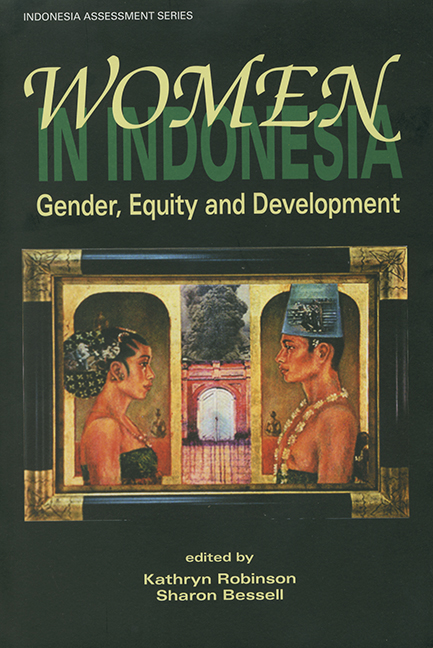Book contents
- Frontmatter
- Contents
- Tables
- Figures
- Contributors
- Acknowledgments
- Glossary
- Prologue
- 1 Introduction to the Issues
- 2 The Mega Factor in Indonesian Politics: A New President or a New Kind of Presidency?
- 3 The Downfall of President Abdurrahman Wahid: A Return to Authoritarianism?
- 4 The Year in Review: From Blind Man's Bluff to Mega Expectations
- 5 Further Comments on the Economy, with a Gender Perspective
- 6 Institution Building: An Effort to Improve Indonesian Women's Role and Status
- Commentary
- 7 Feminism in Indonesia in an International Context
- 8 Gay and Lesbi Subjectivities, National Belonging and the New Indonesia
- 9 And the Winner Is … Indonesian Women in Public Life
- 10 Indonesian Women Artists: Transcending Compliance
- 11 Literature, Mythology and Regime Change: Some Observations on Recent Indonesian Women's Writing
- 12 Women and the Labour Market during and after the Crisis
- 13 Women's International Labour Migration
- 14 Customary Institutions, Syariah Law and the Marginalisation of Indonesian Women
- 15 Women's Grassroots Movements in Indonesia: A Case Study of the PKK and Islamic Women's Organisations
- 16 Women's Activism against Violence in South Sulawesi
- 17 Gender Mainstreaming and Sex-disaggregated Data
- 18 The Changing Indonesian Household
- 19 Women, Family Planning and Decentralisation: New Variations on Old Themes
- 20 Men, Women and Community Development in East Nusa Tenggara
- References
- Index
- INDONESIA ASSESSMENT SERIES
12 - Women and the Labour Market during and after the Crisis
Published online by Cambridge University Press: 21 October 2015
- Frontmatter
- Contents
- Tables
- Figures
- Contributors
- Acknowledgments
- Glossary
- Prologue
- 1 Introduction to the Issues
- 2 The Mega Factor in Indonesian Politics: A New President or a New Kind of Presidency?
- 3 The Downfall of President Abdurrahman Wahid: A Return to Authoritarianism?
- 4 The Year in Review: From Blind Man's Bluff to Mega Expectations
- 5 Further Comments on the Economy, with a Gender Perspective
- 6 Institution Building: An Effort to Improve Indonesian Women's Role and Status
- Commentary
- 7 Feminism in Indonesia in an International Context
- 8 Gay and Lesbi Subjectivities, National Belonging and the New Indonesia
- 9 And the Winner Is … Indonesian Women in Public Life
- 10 Indonesian Women Artists: Transcending Compliance
- 11 Literature, Mythology and Regime Change: Some Observations on Recent Indonesian Women's Writing
- 12 Women and the Labour Market during and after the Crisis
- 13 Women's International Labour Migration
- 14 Customary Institutions, Syariah Law and the Marginalisation of Indonesian Women
- 15 Women's Grassroots Movements in Indonesia: A Case Study of the PKK and Islamic Women's Organisations
- 16 Women's Activism against Violence in South Sulawesi
- 17 Gender Mainstreaming and Sex-disaggregated Data
- 18 The Changing Indonesian Household
- 19 Women, Family Planning and Decentralisation: New Variations on Old Themes
- 20 Men, Women and Community Development in East Nusa Tenggara
- References
- Index
- INDONESIA ASSESSMENT SERIES
Summary
This chapter seeks to examine the labour market experiences of Indonesian women during and since the financial crisis. In particular, it seeks to investigate in what way women's experiences have differed from men's. Several studies were conducted in the year or two following the onset of the crisis, with the aim of examining the labour market impact. Few, however, focused specifically on women's experiences. By using the National Labour Force Survey (Sakernas) data for all years from 1996 to 2000, this study attempts to lay out comprehensively the impact the crisis had on women's labour market opportunities and experiences, and also examine to what extent the market is returning to its precrisis state and whether the crisis looks like having a lasting impact on women's roles in the labour market.
DATA
The Sakernas is conducted in August each year. It consists of a stratified random sample of the population. The sample size has varied over time. Over the period used in this paper it varies from over 70,000 households in 1996 to about 31,500 households in 2000. Sampling weights are provided that allow the samples to be weighted up to represent the entire Indonesian population. These weights vary by province and urban/rural status and are applied in all of the calculations below.
The Sakernas is a standard labour market survey. Respondents are asked some basic demographic questions about their gender, age, educational attainment, marital status and their relationship to the household head. They are then asked a number of questions aimed at establishing their labour market status. If an individual works, then information is collected on the type of work done, the number of hours worked and, if the person is an employee, the wages received. Those not working are asked whether they are searching for work and, if so, what search methods they are using. Since 1997 some questions have been asked about work transitions. This allows us to examine the characteristics of those who lost their jobs during the crisis period and those who have been able to find new positions since the economy began to recover. The Sakernas is not a panel survey and so it is generally not possible to examine the same individual's labour market experience over time.
- Type
- Chapter
- Information
- Women in IndonesiaGender, Equity and Development, pp. 144 - 157Publisher: ISEAS–Yusof Ishak InstitutePrint publication year: 2002



